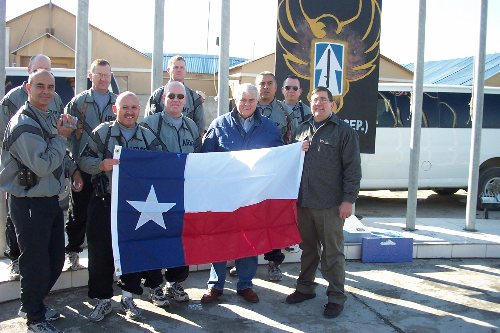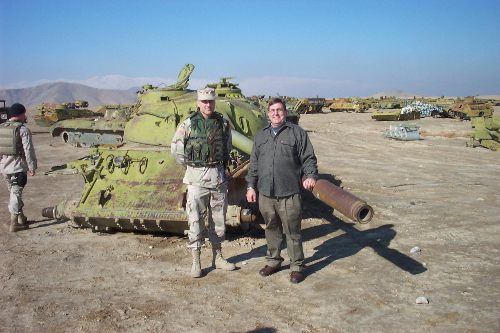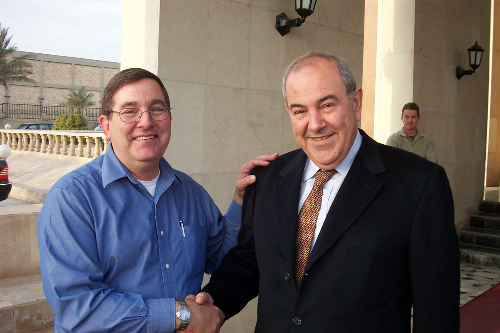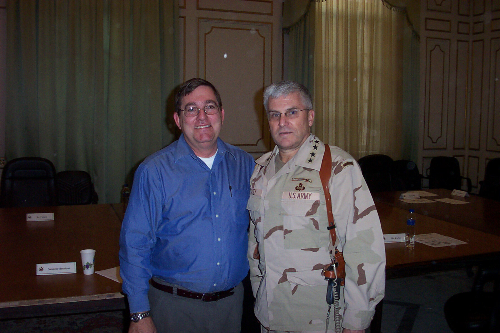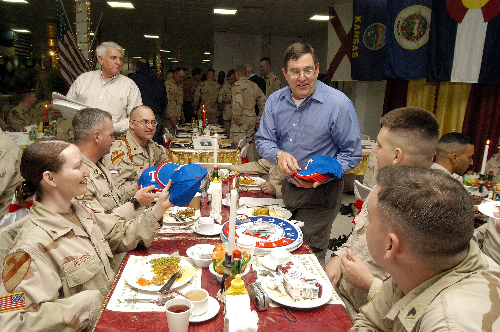CODEL Journal - 14 Jan 2005
Kabul, Afghanistan,
January 14, 2005
|
Michelle Stein
((202) 225-7772)
14 January 2005
Today began with an early morning flight, in a C-130 Aircraft, from Islamabad, Pakistan into the airport at Kabul, Afghanistan. With all the problems we encountered with the weather and mechanical difficulties the day before, this flight was entirely uneventful.
Following our landing at the Kabul airport we were taken to Task Force Phoenix headquarters. There, we were given a briefing by General Moorehead. Task Force Phoenix is charged with training and equipping the Afghan National Army. The briefing by General Morehead was very thorough and got us up-to-date on what had been happening in Afghanistan for the past 12 months.
An enormous amount has been accomplished in the year since my last visit. Task force Phoenix took over the job that was begun by the 10th Mountain division and accelerated the pace of training for the new Afghan National Army. Additionally, they have been encouraging the local militias and warlords to turn in their weapons and several large sequestration areas are now under their control.
Afghanistan, of course, recently completed their national elections some four months ago. Largely drawing from the success of registering voters for the election, the success on Election Day with a strong turnout, and now the acceleration of training the Afghan national Army there certainly is reason to be hopeful about the future of the country.
A year ago during the briefing General Austin talked about the impact that tribal warlords were having upon the stability of the country. Additionally, the remnants of the Taliban and Al Qaeda operatives were also disruptive forces.
The Taliban has been almost completely marginalized by its inability to disrupt the election process. Al Qaeda forces are currently less active because of pressure from the Pakistani Army to the east and continued pressure from coalition forces in the west. President Karzai was largely able to marginalize the effect of the warlords by first incorporating them into his administration, and subsequently replacing those he found unsatisfactory.
Following the briefing we were allowed to meet with several soldiers, one of whom is currently a Texas State Representative from San Antonio, Major Rick Noriega. His guard unit has been activated. He met us outside the briefing room and presented a Texas flag which he says flew over the “Alamo.” “The Alamo” is the name that they have given to their outpost east of Kabul.
We were then taken to the areas where weapons have been sequestered. The damage done by our Air Force during active combat phase in 2001 showed the deadly accuracy of our air attacks. Old Soviet structures lay in ruins, but the roads themselves had been undamaged. There were no random craters around the bombed out buildings, only those structures that had been designated for destruction were affected.
Following lunch with the Marines in the embassy compound we were given an additional briefing by the country team at the American Embassy. A significant portion of this discussion was related to the affect the drug trade has on the economy of Afghanistan. With all of the success following the election, and the acceleration of the new Afghan Army, there is real concern that narco-terrorism may undo the beneficial work that has been accomplished to date.
The current plan to combat the growing drug trade is by increasing public information, both at the level of the government and at the level of the people. It is important to communicate the threat posed by the increasing drug trade as well as its negative effect on investment, international support, and the community at large. There is currently an attempt to provide an alternative livelihood for those farmers who have chosen to grow poppies. They continue to build the infrastructure of the county and provide opportunities for establishing credit and more community-based organizations.
Additionally, there has been significant reform of the justice system from within the country, which had to be created from scratch. Prohibition will remain a significant part of control of the drug trade as well eradication of the fields where poppies are grown.
Significant progress has been made in the re-establishment of civil society in Afghanistan. There are currently more students in school that at any other time in this country's history. There has been a fivefold increase in the number of students in school and 38% of the current students are female. The historical high for female students was 13%; despite the gains, Afghanistan has one-fourth of the maternal deaths worldwide each year -- representing 138,000 deaths per year in Afghanistan.
From a political standpoint, 11 million people registered to vote prior to the presidential elections in September. Over 7 million voters turned out for the presidential election. This was the first democratic election ever in the country of Afghanistan. Since the presidential election, President Karzai has focused more on putting people with technical expertise on his cabinet, and he has placed less reliance on tribal leaders and warlords.
There are currently no political parties and most political decisions are based on personality or ethnic considerations.
We concluded the day with a visit to the presidential palace and a private audience with President Karzai. He emphatically wanted us to convey to the Congress and to the American people how appreciative his country was to America for bringing liberty to their land. And equally as important, after liberation of Afghanistan from the Taliban, was our willingness to stay around and rebuild the country. He felt progress seen in Afghanistan today was the direct results of America's contribution.
He felt the rest of the world was surprised by the progress that has been made in Afghanistan. He stated that the enthusiasm of the Afghan people is evident in the strong number that registered and actually voted on Election Day. He said the vote turnout was especially surprising in view of the fact that the weather was not cooperative on Election Day. He stated that the Afghan people do not normally stand in line, in fact, the concept of standing in line is completely foreign to them, but that everyone did patiently wait in line on Election Day.
He told the story of an old man who fainted in line. When the people around him had revived him, they encourage them to go home; but he refused and returned to his place in line. He wanted to vote in the presidential election. President Karzai said that there appeared to be a mandate since the public recognizing that this ability to vote really represented power in the hands of the people.
On the subject of narcotics trade President Karzai said that his country was embarrassed by the return of the poppy farms. He states that he took this message to the Afghan people and told them that they must free themselves of this menace. He felt then that volunteer eradication appeared to be working in that the number of fields under cultivation with poppies was less than the previous year. He stated that the Afghan people have one thing in their favor and that they like to be well thought of, after years of suffering this has caused them to seek refuge in the easy cash crop of opium but now there is a returning sense of safety. Now they may accept the concept of an alternative livelihood, but they also want the government to hold people accountable and arrest officials who are also drug dealers. He stated that the extent of the desperation was evidenced by the desecration of fruit orchards for poppies fields.
The president summed up by again emphasizing that it was so important to him that we convey the gratitude of the Afghans to the American people. They were grateful to have their country back. They were grateful to have a future. He stated that America would benefit from having such a solid friend as Afghanistan in that portion of the world.
|
Latest from twitter
Get the most up to date news from me on Twitter.

